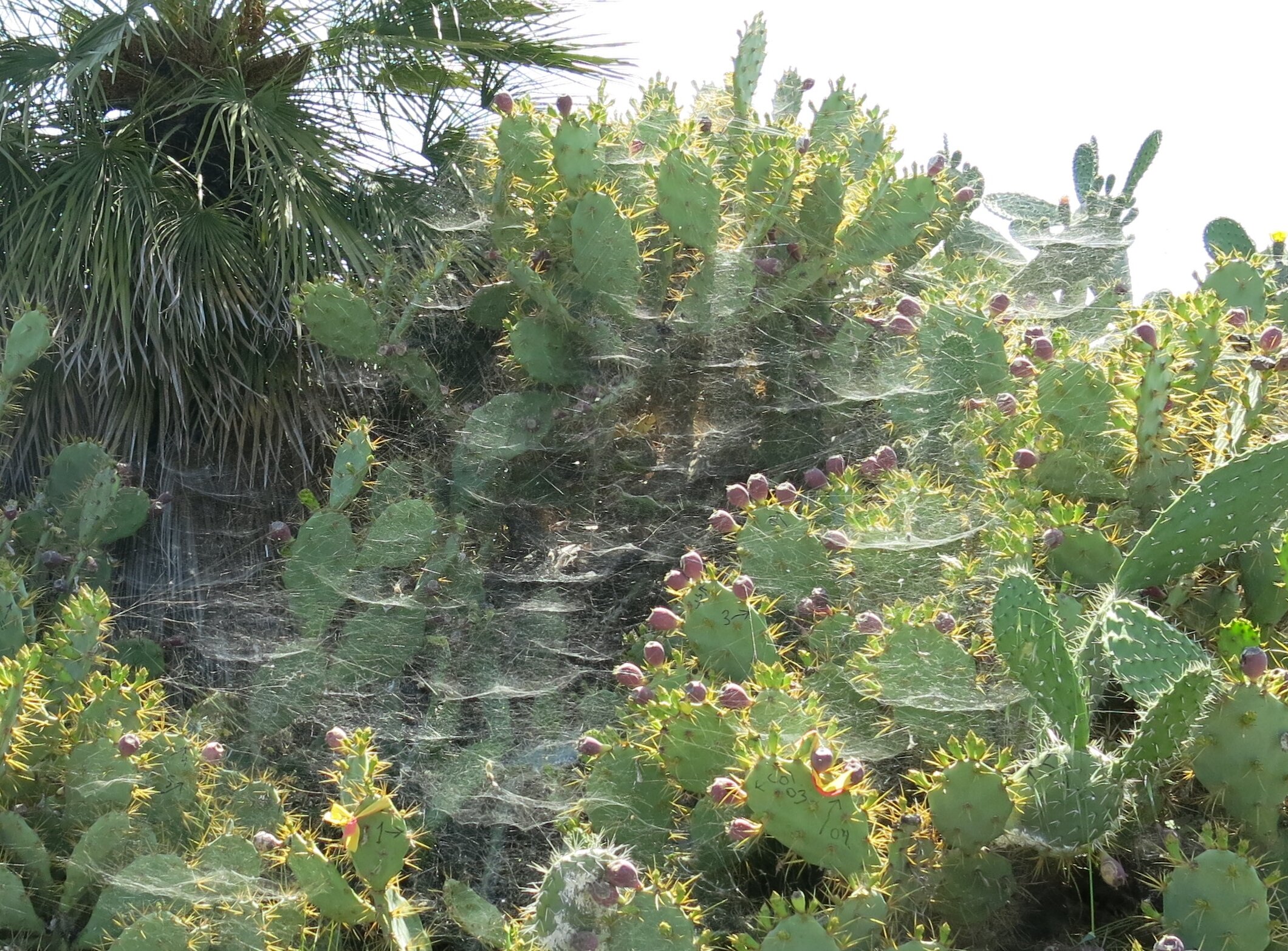A web of the group-living spider Cyrtophora citricola. Credit: Lena Grinsted
Groups of spiders could be used as an environmentally-friendly way to protect crops against agricultural pests.
That’s according to new research, led by the University of Portsmouth, which suggests that web-building groups of spiders can eat a devastating pest moth of commercially important crops like tomato and potato worldwide.
The tomato leafminer moth, Tuta absoluta, has developed resistance to chemical insecticides, which cause human and environmental damage, so different approaches, like using natural predators such as spiders, are needed to combat infestations.
The researchers explored the use of tropical tent web spiders, Cyrtophora citricola, as pest control, as these spiders form groups and are not cannibalistic, and they create large webs to capture prey.
In lab settings, different types of prey—the small tomato leafminer, flightless fruit flies (Drosophila hydei) and larger black soldier flies (Hermetia illucens)—were introduced to colonies of spiders of varying body sizes. Researchers found that larger spiders built larger webs and generally caught more prey, and they easily caught and ate the tomato leafminer and fruit flies, while the larger black soldier flies were rarely caught.
Dr. Lena Grinsted, Senior Lecturer in Zoology in the School of Biological Sciences at the University of Portsmouth, and lead author of the study, said, “Our findings suggest that tropical tent web spiders have the potential to be an effective biological control agent of flying insect pests, at least after growing to medium-sized juveniles.”
“Because they have evolved the ability to live in groups, these spiders might be better suited for biological control than more aggressive, solitary spiders that are prone to cannibalism.”
“Spiders that can form groups of hundreds, or even thousands, of interconnected webs can provide large surface areas of capture webs capable of intercepting high frequencies of airborne insects. Spider colonies also provide a substrate for other spider species, further increasing the number of predators and therefore, potentially increasing pest insect capture capability within colonies.”
Climate change due to human overpopulation and fossil fuel dependence is facilitating the spread of invasive pest species of agricultural crops, such as the tomato leafminer, by expanding their habitable environment ranges.
Tropical tent web spiders are found in colonies around the world and their global range overlaps with regions of moth infestations, including Mediterranean Europe, Africa, Asia, and the Middle East, whose environmental health and economic stability could greatly benefit from this sustainable agricultural approach. Also, as these spiders are already found in these regions, the introduction of pest control spiders will be unlikely to significantly damage native biodiversity.
The researchers further investigated the seasonal variations in web sizes in southern Spain, and found that pest control would be most effective in the tomato planting and growing season in May and June.
However, they found that a wasp species (Philolema palanichamyi) found in the region, whose larvae eat spider eggs, could be detrimental to the spider colony. The researchers found that about half of the spider egg sacs were infected with zero surviving spiderlings.
Dr. Grinsted added, “If wasp infections are controlled, these spiders could form an important part of an integrated pest management system. This could potentially lead to a reduction of reliance on chemical pesticides, resulting in reduced pollutants in soils, waterways, and food chains in the future.”
“Future studies are now needed to investigate whether the spiders may negatively impact crop pollination by also catching and feeding on bees and other key pollinators.”
The paper is published in the journal Insects.
More information: Thomas A. Roberts-McEwen et al, Group-Living Spider Cyrtophora citricola as a Potential Novel Biological Control Agent of the Tomato Pest Tuta absoluta, Insects (2023). DOI: 10.3390/insects14010034
Provided by University of Portsmouth
Citation: Using spiders as environmentally-friendly pest control (2023, February 16) retrieved 27 February 2023 from https://phys.org/news/2023-02-spiders-environmentally-friendly-pest.html
This document is subject to copyright. Apart from any fair dealing for the purpose of private study or research, no part may be reproduced without the written permission. The content is provided for information purposes only.
































